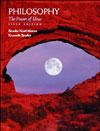| Aesthetics | The philosophical study of art and of value judgments about art and of beauty in general.
|
 |
 |
 |
| Dualism | Two-ism; the doctrine that existing things belong to one or another but not both of two distinct categories of things, usually deemed to be physical and nonphysical or spiritual.
|
 |
 |
 |
| Form | In Plato's philosophy, that which is denoted by a general word (such as "good") that applies to more than a single thing.
|
 |
 |
 |
| Plato | Famous for his Theory of Forms and his two-realm doctrine two separate worlds with two types of knowledge.
|
 |
 |
 |
| Skeptic | One who questions or suspends judgment on the possibility of knowledge.
|
 |
 |
 |
| skepticism | The doctrine that true knowledge is uncertain or impossible.
|
 |
 |
 |
| Socrates | Plato's mentor and philosophy's most illustrious practitioner of the Socratic / dialectic method.
|
 |
 |
 |
| Sophists | Ancient Greek rhetoricians who taught debating skills for a fee.
|
 |
 |
 |
| Sophists | Ancient Greek teachers of rhetoric. Through them and Socrates, moral philosophy began.
|
 |
 |
 |
| Theory of Forms | Plato's central metaphysical concept.
|



 2002 McGraw-Hill Higher Education
2002 McGraw-Hill Higher Education

 2002 McGraw-Hill Higher Education
2002 McGraw-Hill Higher Education